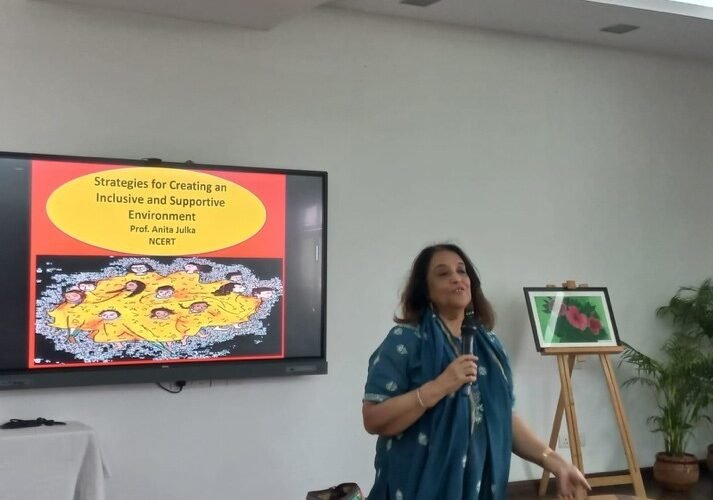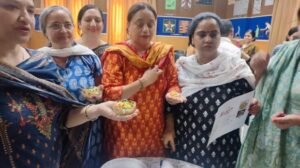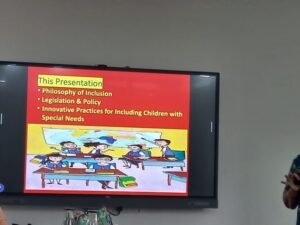Capacity Building Program for TGTs

Day-1
Topics
Session-I:
Group – 1 : Tech needs assessment – designing better learning experience for classrooms.
Group – 2: Inspiring and Assessing Higher Order Thinking Skills and Logical Reasoning for Assessment Validation.
Session-II:
Group – 1: Inspiring and Assessing Higher Order Thinking Skills and Logical Reasoning for Assessment Validation.
Group – 2: Opening pathways for greener, more sustainable Schools.
Session-III:
Group – 1: Developing Microgreens labs in Salwan Schools.
Group – 2: Strategies for creating an inclusive and supportive environment
Day & Date: Monday, 27 May 2024
Venue: SPS, Gurugram
Speakers: Smt. Jasmeet Kaur, an expert in K-12 curriculum leadership and professional development, Dr. Atul Nischal, Founder Director, International Council for School Leadership, Smt. Sunita Madan, Principal, SPS Trans Signature City
No. of Teachers Involved: 79 (Teachers from Salwan Schools)
The session opened with a welcome address by Smt. Vaishali of SPS Gurugram . Dr Atul Nischal, the keynote speaker, emphasised on the importance of assessment and evaluation in the educational process. Smt. Sunita Jhakhar, Vice Principal of SPS Gurugram welcomed him with a warm and welcoming speech. She expressed her hopes for a productive day of learning under the expert guidance of the esteemed mentors. She also encouraged all participants to absorb the valuable knowledge and follow the guided instructions for skill development.
Tech needs assessment – designing better learning experience for classrooms:
The session was led by Smt. Jasmeet Kaur, an expert in K-12 curriculum leadership, professional development, and fostering Adobe Creative Educators community in India through Adobe Express.
Smt. Jasmeet highlighted the significance of incorporating Adobe tools to enrich the teaching-learning process, particularly in today’s digitally savvy generation. She emphasised the need for educators to stay ahead of their students by integrating subject knowledge with digital collaboration.
During the session, Smt. Jasmeet demonstrated various functionalities of Adobe tools, focusing on their practical application in the classroom. One notable feature discussed was the creation of text-to-image prompts using Adobe tools, allowing educators to seamlessly blend textual content with visual elements. This feature enables the customisation of image specifications by modifying text prompts, offering flexibility in content creation.
Furthermore, Smt. Jasmeet introduced animation from audio as another innovative tool for generating images through speech, providing an interactive and engaging way to create visual content. Educators had the opportunity to explore these features hands-on, fostering a deeper understanding of their potential applications in teaching.
The session also showcased how students can present their work through graphics, leveraging Adobe tools to create shareable content that can be collaboratively edited by multiple users. This collaborative aspect promotes teamwork and enables real-time adjustments to suit specific requirements, enhancing overall productivity and creativity in the classroom.
In conclusion, Smt. Jasmeet encouraged educators to embrace digital tools for teaching and learning, advocating for ongoing professional development through courses like ‘Generative AI registration in Adobe Classroom.’ The workshop provided valuable insights and practical skills to empower educators in leveraging technology effectively to enhance the educational experience for students.
Inspiring and Assessing Higher Order Thinking Skills and Logical Reasoning for Assessment Validation
Dr. Atul Nischal, Founder Director, International Council for School Leadership, highlighted that the main objective of assessment is to collect information on student learning and progress, with the aim of improving and understanding their performance. He noted that assessment encourages critical thinking skills and reduces reliance on rote memorisation.
In contrast, evaluation involves assessing outcomes against predefined standards and criteria, essentially making judgments. Dr. Nischal outlined various methods to develop thinking skills in students, which include perception and attention, comprehension and interpretation, memory, reasoning and analysis, problem-solving, decision-making, creativity, imagination, and metacognition—reflecting on one’s own thinking.
He also talked about ‘Norman Webb’s Depth of Knowledge,’ a framework designed to enhance students’ thinking skills, comprising four levels: Recall, Conceptual Thinking, Strategic Thinking, and Extended Thinking. Dr. Nischal concluded by asserting that teachers can serve as catalysts for nurturing students’ thinking skills.
The session was highly interactive, engaging participants and fostering lively discussions.
Opening pathways for greener, more sustainable Schools / Developing Microgreens labs in Salwan Schools
Smt. Sunita Madan, Principal, SPS Tronica, delivered an insightful presentation. She began by introducing microgreens, highlighting their high nutrient density, cholesterol-free nature, easy digestibility, and antioxidant properties.
Smt. Madan connected the microgreens initiative with several Sustainable Development Goals (SDGs). She also shared the vision for the Microgreen Project, emphasising on health benefits, the absence of fertilizers, outdoor learning opportunities, entrepreneurship prospects, sustainable practices, community involvement, and the feasibility of growing microgreens in small spaces.
The Organic Micro Greens (OMG) curriculum was detailed, focusing on hands-on learning, investigation, fostering critical thinking, and sustainability awareness for primary grades. For middle and senior grades, the curriculum introduces hydroponics, design systems training, farming certification, and entrepreneurship skill development. The microgreens curriculum integrates with subjects like science, math, technology, engineering, and physical education.
Smt. Madan highlighted the advantages of microgreens over sprouts, noting their high antioxidant capacity and benefits for anti-diabetic and anti-obesity efforts, while sprouts lacked chlorophyll. Benefits of eating chlorophyll include anti-aging, acne treatment, increase in blood cells , deodorant, wound healing, and cancer protection properties among many others, were also discussed.
The session concluded with a hands-on activity where participants learned to grow microgreens. Each school received kits containing trays, seeds, and coco peat. Participants then prepared salads, wraps, and sandwiches using pre-grown microgreens.
Strategies for creating an inclusive and supportive environment
The session was led by Dr. Anita Julka, Head of the Department of Education at NCERT. The session focused on inclusive education, advocating for equitable learning opportunities regardless of ability or gender. Dr. Julka stressed on the importance of adapting educational practices to foster acceptance and support within institutions, aligning with national initiatives for inclusive education.
The Resource Person emphasised on the need for inclusive classrooms in India to address diverse needs and to promote equity, citing challenges like inadequate training and societal attitudes, requiring policy implementation and attitude shifts.
Dr. Anita Julka provided targeted strategies to enhance inclusivity in Math, Science, English, and Social Science. She emphasised differentiated instruction, advocating for visual aids, hands-on experiments and tech tools in Math and Science. In English, diverse reading materials and varied expression forms were recommended. Social Science saw storytelling and multimedia integration. Dr. Julka stressed on scaffolding and peer support for success. Her approach aimed at adaptive, engaging and supportive environments, valuing each student’s potential across subjects, fostering deeper understanding and ensuring inclusivity in learning.
The day ended with a valedictory address by Smt. Vandana Chopra, a senior TGT from SPS RN, bringing a successful and engaging workshop to a close. Smt. Purnima Pant, Senior TGT-TDSC, highlighted the transformative impact of Dr. Atul Nischal’s sessions on Higher Order Thinking Skills, Smt. Sunita Madan’s insights on sustainable schools and Prof. Anita Julka’s inclusive strategies. The session delivered valuable insights and practical tools for fostering inclusivity, leaving participants empowered with actionable strategies for effective student support.
























Leave a Reply